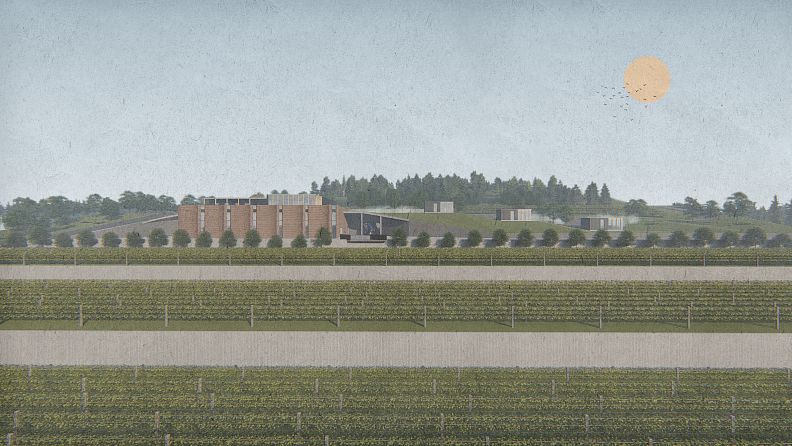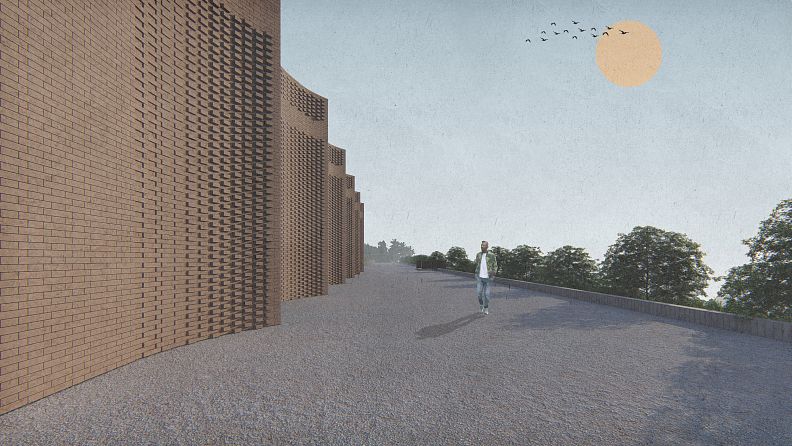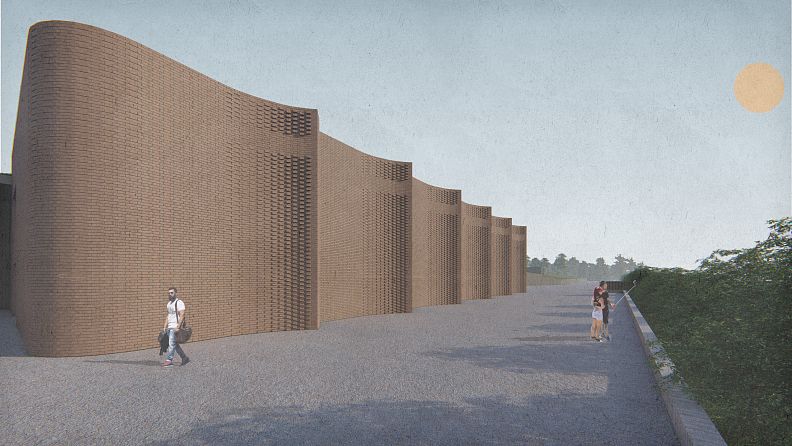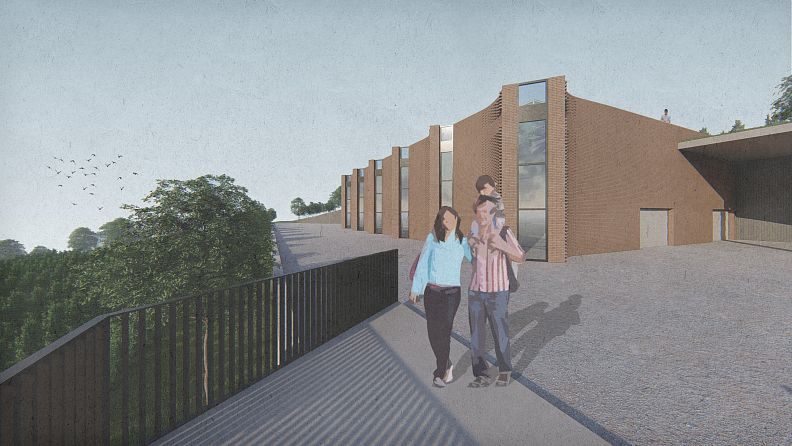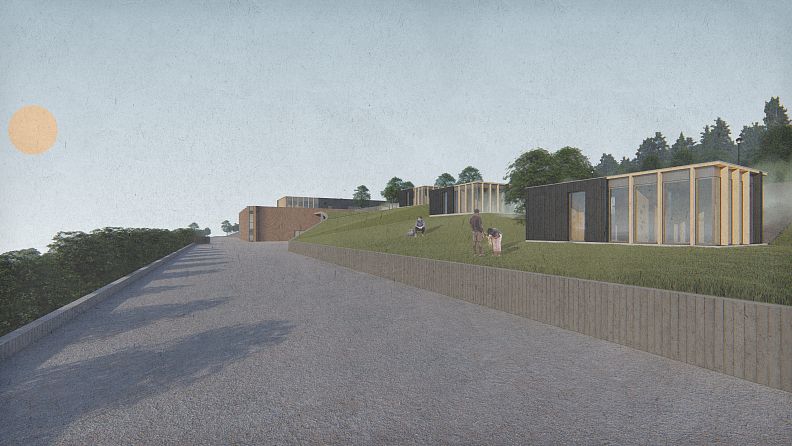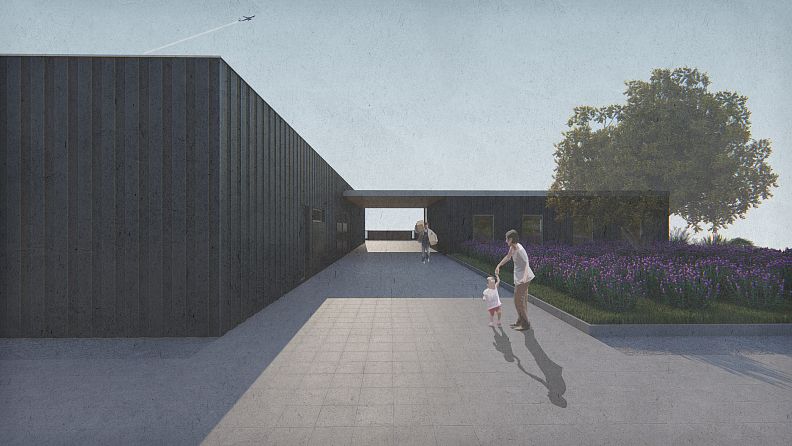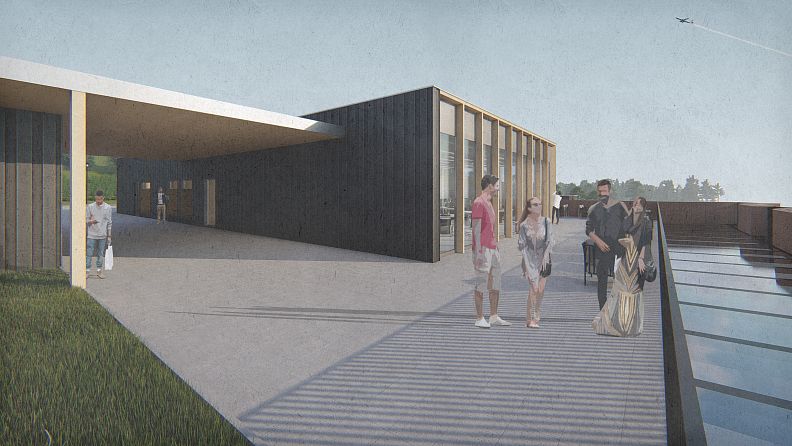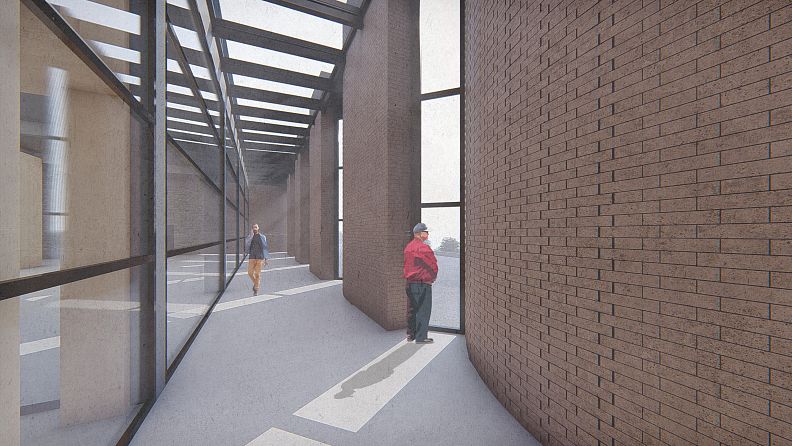WINERY IN BRATISLAVA

Project idea
Projekt sa venuje architektonickému návrhu vinárstva v Bratislave v historickom území Malých Karpát. Pri návrhu som vychádzal z územného plánu mesta Bratislava a riešil som väzby na okolité prostredie. Návrhom v tejto oblasti by som chcel vyzdvihnúť vínny turizmus v Bratislave a jeho historický význam pre Slovensko. Návrh osadenia objektu vinárstva s reštauráciou, ako aj ubytovacích jednotiek, som prispôsoboval svahovitosti terénu a súčasnej výsadbe viniča. Objekty som sa snažil umiestňovať tak, aby čo najviac zapadli do prostredia viníc a nepôsobili z pohľadu mesta príliš okázalo. Celú stavbu vinárstva, som sa snažil navrhnúť plnú zážitkových vnemov pre potencionálnych návštevníkov vinárstva aj reštaurácie a zároveň dodržať všetky typologické zásady priemyselnej budovy, pre bezproblémový chod výroby.
The project deals with the architectural design of a winery in Bratislava in the historical territory of the Little Carpathians. I based the design on the zoning plan of the city of Bratislava and dealt with the links to the surrounding environment. With a proposal in this area, I would like to highlight wine tourism in Bratislava and its historical significance for Slovakia. I adapted the design of the winery with a restaurant, as well as accommodation units, to the slope of the terrain and the current planting of the vineyard. I tried to place the objects so that they fit into the environment of the vineyards as much as possible and did not look too ostentatious from the city's point of view. The whole construction of the winery, I tried to design full of experiential sensations for potential visitors to the winery and restaurant, while adhering to all the typological principles of the industrial building, for the smooth running of production.
Project description
Hlavnou funkciou vinárstva je zabezpečiť zázemie pre sezónny zber hrozna, jeho spracovanie a na samotnú výrobu vína, jeho skladovanie a expedíciu. Priemyselné priestory určené na výrobu a skladovanie vína sa nachádzajú na spodných dvoch podlažiach, pričom sú úzko prepojené aj s prehliadkovými priestormi pre verejnosť. Pridruženou funkciou je lokálny predaj vlastného vína s možnosťou prehliadkovej trasy vinárstvom. Prehliadka má okružný charakter, kde začína v najvyššom poschodí v predajni vína, a tak isto aj končí v predajni. Prehliadka obsahuje všetko od prehliadky viníc, celého procesu výroby a skladovania vín, až po jeho degustáciu a prehliadku archívnych vín. Na najvyššom podlaží (1.NP), ktoré je zároveň prístupné aj z terénu sa okrem lokálnej predajne vína, nachádza aj reštaurácia s výhľadom na vinice a mesto Bratislava. Ako súčasťou areálu viníc sú navrhované aj tri samostatne stojace apartmánové domčeky.
Objekt vinárstva navrhol ako mohutný tehlový múr, ktorý pôsobí z bezprostrednej blízkosti veľmi dominantne a dáva jasne najavo čo je hlavná funkcia tejto stavby. Pridružené funkcie, som navrhol ako nízke drevostavby, ktoré sa príliš nesnažia svojim vzhľadom pútať pozornosť viac ako samotné vinárstvo a zároveň poskytujú tie najlepšie výhľady na vinice a mesto.
The main function of the winery is to provide facilities for the seasonal harvesting of grapes, their processing and for the actual production of wine, its storage and dispatch. The industrial premises intended for the production and storage of wine are located on the lower two floors, while they are also closely connected with the exhibition spaces for the public. An associated function is the local sale of your own wine with the possibility of a tour of the winery. The tour has a sightseeing character, where it starts on the top floor in the wine shop, and also ends in the shop. The tour includes everything from a tour of vineyards, the entire process of wine production and storage, to its tasting and tour of archival wines. On the top floor (1st floor), which is also accessible from the field, in addition to the local wine shop, there is also a restaurant overlooking the vineyards and the city of Bratislava. Three detached apartment houses are also proposed as part of the vineyard complex.
I designed the winery as a massive brick wall, which looks very dominant from the immediate vicinity and makes it clear what the main function of this building is. The associated features, I designed as low-rise wooden buildings, which do not try much to attract more attention than the winery itself, while providing the best views of the vineyards and the city.
Technical information
Hlavný nosný systém objektu vinárstva tvorí železobetónová skeletová konštrukcia, nosná v priečnom smere s osovou vzdialenosťou 6 m. Stĺpy nosného skeletu sú prierezu 500x300 mm a vysoké 6000 mm. V juhovýchodnej tehlovej fasáde navrhujem stĺpy rozmeru 300x300 mm s výškou 7350 mm, ktoré sú stužené oblúkovými prievlakmi rozmeru 800x300 mm. Tieto stĺpy slúžia v oblúkovej tehlovej fasáde na prenášanie horizontálnych síl. Samotná oblúková čelná fasáda má samonosnú funkciu vo vertikálnom smere a je navrhnutá z plných pálených tehál kladených na pol-krížovú väzbu.
Objekt reštaurácie, obchodu z vínom aj ubytovacie domčeky navrhujem z drevených masívnych CLT panelov Novatop. Jedná sa o prefabrikovaný systém, kde obvodové nosné panely tohto systému majú šírku 124 mm a vnútorné 84 mm. Tieto masívne drevené panely sa na stavbu dovezú s predpripravenými otvormi, uložia sa na základovú dosku a spoja sa priamo na stavbe do požadovaného rozmeru a tvaru, vlastným príslušným spojovacím systémom. Okrem spomínaných objektov, ktoré sú komplet celé riešené ako drevostavby, sa drevené vložené konštrukcie nachádzajú aj v priestoroch výroby vína kde členia priestor na jednotlivé miestnosti. CLT panely sú tvorené z vysušeného smrekového dreva skladaného do vrstiev.
The main supporting system of the winery building consists of a reinforced concrete skeletal structure, supporting in the transverse direction with an axial distance of 6 m. The columns of the supporting skeleton have a cross-section of 500x300 mm and a height of 6000 mm. In the south-eastern brick facade, I design columns measuring 300x300 mm with a height of 7350 mm, which are reinforced with arched girders measuring 800x300 mm. These columns are used in the arched brick facade to transmit horizontal forces. The arched front façade itself has a self-supporting function in the vertical direction and is designed from solid fired bricks placed on a semi-cross bond.
I design the restaurant, wine shop and accommodation houses from solid wooden CLT panels Novatop. It is a prefabricated system, where the peripheral load-bearing panels of this system have a width of 124 mm and an inner width of 84 mm. These solid wood panels are brought to the construction site with pre-prepared holes, placed on the base plate and joined directly on the construction site to the required size and shape, by our own appropriate connection system. In addition to the mentioned objects, which are completely designed as wooden buildings, wooden embedded structures are also located in the wine production premises where they divide the space into individual rooms. CLT panels are made of dried spruce wood stacked in layers.




